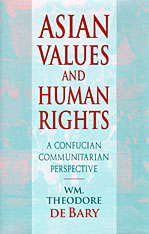
Since the horrific Tiananmen Square massacre in 1989, the debate on human rights in China has raged on with increasing volume and shifting context, but little real progress. In this provocative book, one of our most learned scholars of China moves beyond the political shouting match, informing and contextualizing this debate from a Confucian and a historical perspective.
"Asian Values" is a concept advanced by some authoritarian regimes to differentiate an Asian model of development, supposedly based on Confucianism, from a Western model identified with individualism, liberal democracy, and human rights. Highlighting the philosophical development of Confucianism as well as the Chinese historical experience with community organization, constitutionalism, education, and women's rights, Wm. Theodore de Bary argues that while the Confucian sense of personhood differs in some respects from Western libertarian concepts of the individual, it is not incompatible with human rights, but could, rather, enhance them.
De Bary also demonstrates that Confucian communitarianism has historically resisted state domination, and that human rights in China could be furthered by a genuine Confucian communitarianism that incorporates elements of Western civil society. With clarity and elegance, Asian Values and Human Rights broadens our perspective on the Chinese human rights debate.
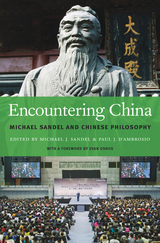
In the West, Harvard philosopher Michael Sandel is a thinker of unusual prominence. In China, he’s a phenomenon, greeted by vast crowds. China Daily reports that he has acquired a popularity “usually reserved for Hollywood movie stars.” China Newsweek declared him the “most influential foreign figure” of the year. In Sandel the Chinese have found a guide through the ethical dilemmas created by the nation’s swift embrace of a market economy—a guide whose communitarian ideas resonate with aspects of China’s own rich and ancient philosophical traditions.
Chinese citizens often describe a sense that, in sprinting ahead, they have bounded past whatever barriers once held back the forces of corruption and moral disregard. The market economy has lifted millions from poverty but done little to define ultimate goals for individuals or the nation. Is the market all there is? In this context, Sandel’s charismatic, interactive lecturing style, which roots moral philosophy in real-world scenarios, has found an audience struggling with questions of their responsibility to one another.
Encountering China brings together leading experts in Confucian and Daoist thought to explore the connections and tensions revealed in this unlikely episode of Chinese engagement with the West. The result is a profound examination of diverse ideas about the self, justice, community, gender, and public good. With a foreword by Evan Osnos that considers Sandel’s fame and the state of moral dialogue in China, the book will itself be a major contribution to the debates that Sandel sparks in East and West alike.
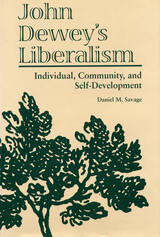
John Dewey's classical pragmatism, Daniel M. Savage asserts, can be used to provide a self-development-based justification of liberal democracy that shows the current debate between liberal individualism and republican communitarianism to be based largely on a set of pseudoproblems.
From Dewey's classical pragmatism, Savage derives a conception of individual autonomy that, while meeting all of the criteria for a conception of autonomy, does not, as the dominant Kantian variant does, require transcendence from any particular language community. The Deweyan conception of autonomy that Savage derived from classical pragmatism, in fact, requires that the individual be situated within a context of cultural beliefs. Savage argues that this particular conception of autonomy is necessary if one wants to conceive of life, as communitarians do, as a quest for the good life within a social context.
Thus, Savage constructs a conception of autonomy that consists of a set of intellectual virtues, each of which can be understood, like Aristotle's moral virtues, as a mean between two extremes (or vices). The virtue of critical reflection is the mean between the vices of dogmatism on the one hand and philosophical skepticism on the other. The virtue of creative individuality is the mean between the opposing vices of conformity and eccentricity. Finally, the virtue of sociability is the mean between the extremes of docility and rebelliousness.
The three virtues together provide a natural method of adapting to change. The method is natural because it is in accord with a continuous cycle of activity—tension/movement/harmony—that is generic to all living things, Dewey's method of adapting to change requires, in both the individual and in the community, the synthesis of integrating and differentiating forces.
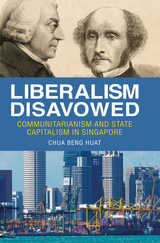

This first book-length study of the Ruskin colonies shows how several hundred utopian socialists gathered as a cooperative community in Tennessee and Georgia in the late nineteenth century. The communitarians' noble but fatally flawed act of social endeavor revealed the courage and desperation they felt as they searched for alternatives to the chaotic and competitive individualism of the age of robber barons and for a viable model for a just and humane society at a time of profound uncertainty about public life in the United States.
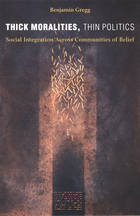
Thick Moralities, Thin Politics grapples with the work of theorists from both sides of the Atlantic, including Jürgen Habermas, Anthony Giddens, and Niklas Luhmann, as well as George Herbert Mead, Erving Goffman, and Harold Garfinkel. Gregg develops a model of validity for arguments made in the public sphere, for understanding among competing worldviews, and for adjudicating disputes generated by normative differences. He applies his theory of politics to specific issues of contemporary social life, including those relating to the place of women, minorities, and multiculturalism in American and European society today. He also addresses the scientific study of religion, issues of legal interpretation, and the critique of ideology, in each case illuminating how different epistemic systems, as well as competing value systems, can achieve some understanding of one another. Gregg demonstrates, ultimately, that thin politics actually further, rather than reduce, citizens' engagement in the political process.
READERS
Browse our collection.
PUBLISHERS
See BiblioVault's publisher services.
STUDENT SERVICES
Files for college accessibility offices.
UChicago Accessibility Resources
home | accessibility | search | about | contact us
BiblioVault ® 2001 - 2024
The University of Chicago Press









